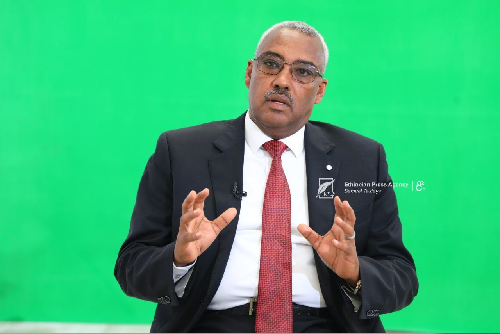Ethiopia’s diplomacy continues to better safeguard national interests: DPM Demeke
Addis Ababa, January 11, 2024 (FBC) – Meticulous diplomacy has guided Ethiopia for 116 years with little or no hiccups and its Foreign Policy, which is inextricably fastened with its national security, has brought tangible results to protect its interest, the Deputy Prime Minister and Foreign Minister Demeke Mekonnen said.
Speaking to EPA in connection with the Diplomacy Week, Deputy Prime Minister and Foreign Affairs Minister Demeke Mekonnen stated that the event is of paramount importance to draw lessons from past diplomacy to today’s and tomorrow’s engagement.
In its 116 years existence, the Ministry of Foreign Affairs has been spearheading Ethiopia’s national interest and the Diplomacy Week is instrumental to uphold results that have been gained and address the shortcomings.
Economic, multilateral and citizen-centered diplomacy are pillars of the current Ethiopia’s Foreign Policy and the country has moved quickly to integrate the East African region with infrastructure and embrace its neighbors. Ethiopia’s foreign relations preponderantly focus on ensuring national interest and sovereignty, the FM elaborated.
“Ethiopia’s Foreign Policy was designed in the way to embrace its neighbors and it is the major factor behind the country’s huge involvement in regional economic integration. The policy also attaches significance to forge strong relations with countries from all corners of the world and the Diplomacy Week provides the opportunity to address our weaknesses and further cement strengths.”
Demeke added, “Moving in such a well-defined avenue, of course, would help the country be known in the world, get its sovereignty and national interest respected as well as help its voice to be heard louder.”
The Deputy Premier further emphasized the need to review past diplomatic engagements and draw the positive experiences that would help to formulate a viable approach in today’s dynamic and mostly unpredictable and technology-enabled diplomacy era.
The mere reliance of the traditional diplomatic approach which is based on the deployment of ambassadors and envoys are no longer sufficient in today’s order and citizens’ diplomacy that enshrines the active involvement of Ethiopian Diasporas has become equally important.
About challenges, Demeke indicated that Ethiopia had been faced unwarranted and coordinated attempts of meddling and pressures from some global powers during the Tigray War and in the three years of reform. Through employing a meticulous diplomatic approach, the government has managed to change such hostile relations and opened a new chapter of re-engagement and normalization.
In this regard, Ethiopian Diasporas have made commendable jobs in the No More movement whereby they carried out wide-ranging activities to denounce some interest groups’ unwarranted pressure in the reform government and promote Ethiopia’s reality in their respective areas of residence. By doing this, the Diasporas have greatly supported the government’s efforts to repulse the danger posed in Ethiopia’s existence, Demeke remarked.

